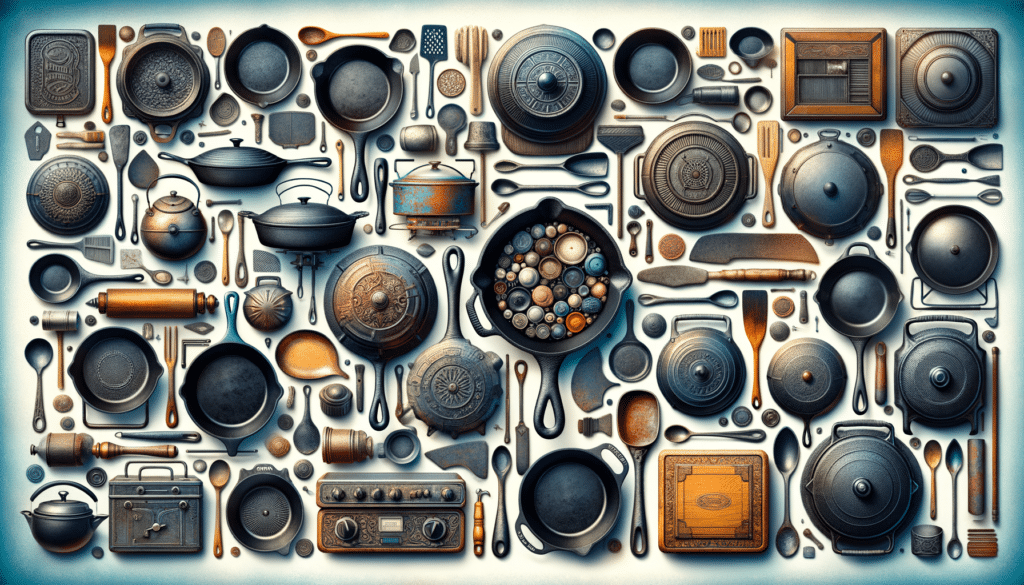Where to Find Antique Cast Iron
Antique cast iron skillets are cherished by collectors and culinary enthusiasts alike, not just for their functionality but also for their historical value. These skillets can be found in a variety of places, each offering a unique treasure hunting experience. Estate sales are a treasure trove for vintage cast iron. Often, these sales include kitchen items that have been used and loved over generations. The key is to arrive early and have a keen eye for spotting genuine cast iron amid the clutter. Auctions, both online and in-person, are another excellent source. While online auctions provide convenience, in-person auctions allow you to inspect the item closely for authenticity and condition.
Flea markets are yet another exciting venue to explore. They offer a diverse range of items, and with a bit of luck, you might stumble upon a valuable piece. When visiting flea markets, it’s beneficial to engage with sellers who specialize in kitchenware, as they might have insights into the history and value of the pieces they are selling. Antique shops and thrift stores are also worth a visit. While antique shops might price items higher due to their curated collections, thrift stores can offer surprisingly good deals if you’re willing to hunt through their inventory.
Finally, online marketplaces have become increasingly popular for finding antique cast iron. Websites dedicated to vintage and antique goods often have a wide selection, but it’s crucial to verify the seller’s credibility and request detailed photos to ensure the piece’s authenticity and condition.
Flea Market Cast Iron Skillets
Flea markets are bustling hubs of activity where one can find an eclectic mix of items, including cast iron skillets. These markets are ideal for those who enjoy the thrill of the hunt, as they offer a wide variety of products from different eras. When searching for cast iron skillets at flea markets, it’s important to know what to look for. Genuine antique skillets often have certain characteristics, such as a smooth cooking surface, a specific weight, and a maker’s mark or logo on the bottom.
Engaging with vendors is a great way to gather information about a skillet’s history and authenticity. Many vendors at flea markets are passionate about their wares and can provide valuable insights into the origins of their items. Additionally, bargaining is a common practice at flea markets, so don’t hesitate to negotiate the price. However, it’s essential to be respectful and realistic about the value of the item.
Timing your visit to a flea market can also impact your success. Arriving early gives you the first pick of items, while visiting towards the end of the day might present opportunities for better deals as vendors are often eager to sell remaining stock. Remember to bring cash, as not all vendors accept card payments, and having cash on hand can also be a bargaining tool.
Old Cast Iron Skillet Value
The value of an old cast iron skillet is determined by several factors, including its age, condition, brand, and rarity. Skillets from renowned manufacturers are generally more sought after and can command higher prices. The condition of the skillet is crucial; skillets with a smooth cooking surface and no cracks or warping are more valuable. Patina, the natural seasoning that develops over time, is also a desirable feature, as it indicates the skillet has been well-used and cared for.
Rarity plays a significant role in determining value. Limited edition pieces or those with unique features, such as unusual handle designs or rare logos, are highly prized by collectors. To accurately assess the value of an old cast iron skillet, it’s beneficial to consult price guides or seek the expertise of a professional appraiser.
Online platforms and collector forums can also provide insights into current market trends and values. These communities are often filled with enthusiasts who are eager to share their knowledge and experiences. When buying or selling an old cast iron skillet, transparency about its condition and history is key to ensuring a fair transaction.


